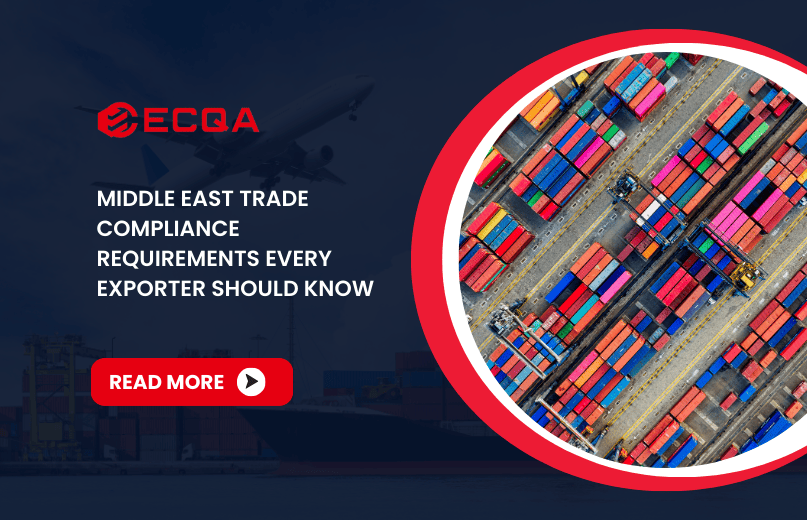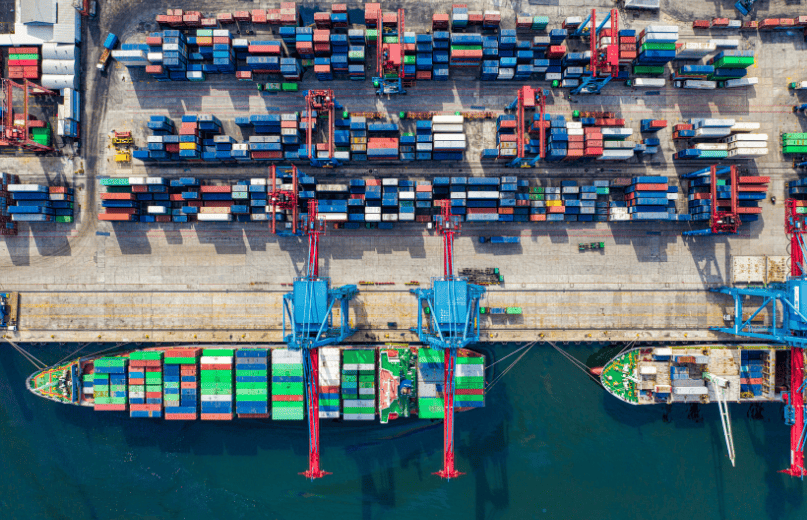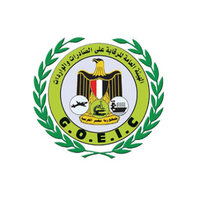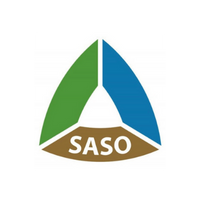
Middle East Trade Compliance Requirements Every Exporter Should Know
Middle East trade compliance is a cornerstone of successful export operations. Countries across the region enforce strict regulatory frameworks to ensure that imported goods meet national standards for quality, safety, and conformity. Exporters who neglect these requirements risk costly shipment delays, rejected cargo, and reputational damage.
To trade smoothly in markets like Egypt, Saudi Arabia, Morocco, and beyond, exporters must secure the right Certificate of Conformity (CoC), inspection documents, and government approvals before their goods leave port.

This guide provides a detailed overview of the mandatory trade compliance requirements across key Middle East markets. It also highlights common challenges exporters face and explains how independent inspection and certification providers can simplify the process.
Why Trade Compliance Matters in the Middle East
The Middle East is a diverse trade region with high demand for consumer goods, industrial equipment, textiles, electronics, and food products. Governments in these markets impose conformity requirements to:
- Protect consumers from substandard or unsafe products.
- Safeguard local industries by filtering out non-compliant imports.
- Ensure goods align with national standards and international norms.
- Improve transparency and trust in cross-border trade.
Failure to comply with these requirements does more than interrupt logistics. Non-compliance can lead to heavy demurrage charges, blacklisting of suppliers, and loss of trust with buyers.
Core Certificates of Conformity Across the Middle East
Each country enforces its own compliance scheme. Below are the primary certificate programs exporters must understand when shipping goods to Middle Eastern markets.
Egypt: Certificate of Inspection (COI) and Certificate of Conformity (CoC)

Egypt’s General Organization for Export and Import Control (GOEIC) mandates that certain regulated products carry either a Certificate of Inspection (COI) or a Certificate of Conformity (CoC). These documents confirm that the goods meet Egyptian safety and quality standards before being cleared for customs.
Key details:
- Exporters must use GOEIC-approved inspection bodies.
- Certificates are required for products like textiles, electrical appliances, chemicals, and foodstuffs.
- Shipments without the proper documentation are rejected at port.
Saudi Arabia: SABER Certificate of Conformity

Saudi Arabia operates under the SABER platform, managed by the Saudi Standards, Metrology and Quality Organization (SASO). Every imported product requires a Product Certificate of Conformity and, in many cases, a Shipment Certificate of Conformity.
Key details:
- Registration on SABER is mandatory for exporters and importers.
- Products must comply with Saudi Technical Regulations.
- Non-compliance blocks customs clearance entirely.
Morocco: Verification of Conformity (VoC)
Morocco enforces a Verification of Conformity (VoC) program overseen by the Ministry of Industry, Trade, Green and Digital Economy.
Key details:
- Products must be tested against Moroccan or international standards.
- Certificates are issued by authorized third-party bodies.
- Targeted sectors include building materials, electrical goods, and textiles.
Algeria: Certificate of Conformity (CoC)
Algeria requires exporters to present a Certificate of Conformity (CoC) under its Conformity Assessment Program.
Key details:
- Regulated by the Algerian Ministry of Commerce.
- Products such as household appliances, construction materials, and automotive parts are heavily monitored.
- Inspections ensure safety, labeling accuracy, and packaging compliance.
Other Key Programs in the Region
- Tunisia: Select goods require conformity documentation to ensure compliance with national quality standards.
- Jordan: Product conformity certification is required for electronics, household goods, and industrial imports.
- Kuwait and Qatar: Each enforces sector-specific conformity checks for regulated goods.
Common Challenges Exporters Face in Middle East Trade Compliance
Even experienced exporters can struggle with regional compliance. Common issues include:
- Complex paperwork: Multiple certificates, test reports, and registrations may be required for a single shipment.
- Changing regulations: Countries frequently update conformity requirements, creating uncertainty.
- Approval delays: Coordination between exporters, certification bodies, and local authorities often slows down clearance.
- Language and documentation barriers: Certificates and labeling often need to match Arabic requirements.
- Overlapping standards: Some countries reference international ISO/IEC standards, while others apply local benchmarks.
How Independent Certification and Inspection Providers Help
Working with an accredited third-party certification provider streamlines the entire compliance process. Key advantages include:
- Unbiased evaluation: Independent inspection ensures goods are tested impartially against the required standards.
- Global coverage: Accredited providers often operate across multiple countries, supporting exporters targeting several Middle Eastern markets.
- Efficiency and speed: Certification providers coordinate directly with national authorities to reduce processing delays.
- Documentation support: Experts ensure labeling, packaging, and certificates are aligned with country-specific requirements.
- Risk reduction: By detecting non-conformities before shipment, exporters avoid costly rejections at port.
Compliance Checklist for Exporters Targeting the Middle East
Exporters can reduce risk by adopting a structured compliance approach:
- Identify the importing country’s mandatory certificate program (CoC, VoC, SABER, etc.).
- Confirm the product category is covered under the program.
- Appoint a recognized certification body for inspection and testing.
- Prepare all supporting documentation (test reports, invoices, product specifications).
- Ensure packaging, labeling, and language requirements meet local standards.
- Secure certificates before shipment departs from the exporting country.
- Maintain a record of compliance documents for audit purposes.
Exporting to the Middle East requires more than market knowledge. It demands strict attention to trade compliance requirements that vary across countries and product categories. By securing the correct certificates, working with accredited inspection bodies, and maintaining organized documentation, exporters can avoid costly delays and ensure their goods move seamlessly into these growing markets.
Choose a reliable inspection and certification partner to handle compliance end-to-end and ensure your shipments meet all Middle East trade requirements.

 Request Free Sample Report
Request Free Sample Report